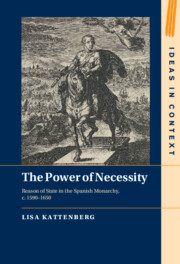Book contents
- The Power of Necessity
- Ideas in Context
- The Power of Necessity
- Copyright page
- Dedication
- Contents
- Figures
- Tables
- Acknowledgements
- Introduction
- Chapter 1 Necessity and Counter-Reformation Reason of State
- Chapter 2 ‘The Inexhaustible Ocean of Politics’
- Chapter 3 Virgilio Malvezzi and the Mosaics of Morality and Necessity
- Chapter 4 Experience, Conscience and Necessity
- Conclusion
- Bibliography
- Index
Chapter 3 - Virgilio Malvezzi and the Mosaics of Morality and Necessity
Published online by Cambridge University Press: 22 December 2022
- The Power of Necessity
- Ideas in Context
- The Power of Necessity
- Copyright page
- Dedication
- Contents
- Figures
- Tables
- Acknowledgements
- Introduction
- Chapter 1 Necessity and Counter-Reformation Reason of State
- Chapter 2 ‘The Inexhaustible Ocean of Politics’
- Chapter 3 Virgilio Malvezzi and the Mosaics of Morality and Necessity
- Chapter 4 Experience, Conscience and Necessity
- Conclusion
- Bibliography
- Index
Summary
This chapter focuses on the oeuvre and actions of Virgilio Malvezzi, the Bolognese historian who had a prominent career in the service of Philip IV and the Count-Duke of Olivares. Following Malvezzi to the Low Countries and his small-scale diplomacy with French nobles conspiring against the King of France, it traces how in his letters he reflected on necessity and the moral legitimacy of political action. Through the ordering of information, he reported circumstances in such a way that they legitimized the application of unorthodox strategies such as dissimulation and pretence. As we can observe in the emergence of one of his published historical works from a newly discovered manuscript draft, the practice of ordering historical particulars and aphorism-like observations was also present in Malvezzi’s writing techniques. It shows how the method of ordering could also be at the base of a chronological narrative and how extenuating necessity could then be used in the context of an apologetic political history. The oeuvre and well-documented career of Virgilio Malvezzi thus provide a rare opportunity to address the limitations and opportunities of the continuity between theory and political practice in reason-of-state discourse.
Keywords
- Type
- Chapter
- Information
- The Power of NecessityReason of State in the Spanish Monarchy, c. 1590–1650, pp. 127 - 179Publisher: Cambridge University PressPrint publication year: 2023



